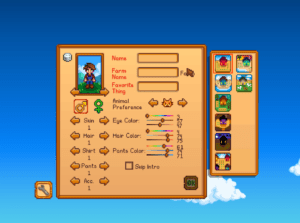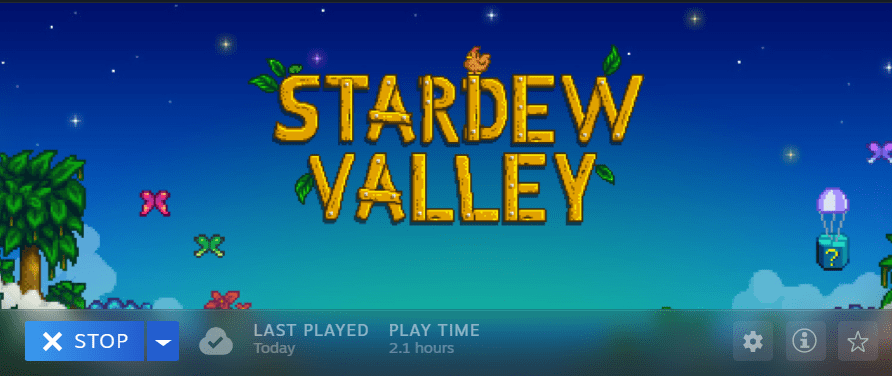Stardew Valley is a peaceful farming life simulator created in 2016 by an independent game developer, Eric Barone (otherwise known as “ConcernedApe,” just like in the game’s opening credits). I’ve heard of the game many times but haven’t formally played it until recently. I’d recommend this game to anybody looking to take a break from life or has time to kill, as it has a similar aesthetic to Minecraft’s freeform nature. Although I played it on my computer via Steam, the game is also available for Nintendo Switch, Android, macOS, PlayStation 4, iOS, and more!

Figure 1: An image of the game I purchased on Steam; play time was 2.1 hours
Stardew Valley reflects many of Chess’s ideas about “playing as a feminist.” To list a few, the game reflects casual gameplay (as opposed to something more competitive), mimics an environment that is very much non-toxic, does not have a major “climax” as a game of abnegation (following the 8 kinds of fun), and provides the player a large deal of agency and control. Because of this, I think the game is very fitting for people of all genders, and it does not come off as intimidating to introduce any sort of “toxicity barrier” that Chess has criticized many popular games for having. However, as part of my personal critique, I did not really enjoy Stardew Valley because I was not looking for a game to spend leisure time on (which Chess argues is something that more women need to do through play). I will expand more on how this game reflects feminist theory and offer some of my personal experience throughout this critical play, ending off with a discussion question to make us think.

Figure 2: An image showing the potential expressiveness of the character customization scene
One of Chess’s points about feminism in games was to proliferate the ability to have agency or control. I believe that many features in Stardew Valley accomplish this (if not already made obvious by my categorization of it as “abnegation”). Firstly, the character customization screen (shown above) lets the player quite literally customize their persona that lives through the experience—allowing me to walk, farm, and live vicariously through my digital variant. Secondly, there is a lack of explicit, handheld rules or quests in Stardew Valley, which makes the player feel free to explore and figure out what works. Thirdly, there is a split between the player’s area (the farm) and society, allowing the player to choose an introverted or extroverted life by nature without overt penalty (you can even sell your crops through your mailbox if you’d like!). Finally, I think the mechanic of having time go by passively is an extremely powerful tool for simulating real life. There is no strict direction, and the player must decide how to spend their time. All of these different features combined created a very explorative aesthetic, allowing me to submerge myself into my own universe.

Figure 3: An image showcasing “social obstacles” present in Stardew Valley, different from what I’ve seen in many other games
The game also introduces social barriers, defeating a “masculine” norm of video game obstacles typically being physical or largely gamified concepts (e.g., shooting monsters or enemy players). For example, as shown in the image above, rather than making every house walk-inable and allowing the player to loot (much like Pokemon, where you can go into houses and waltz around at your disposal), you must forge friendships with the local townspeople to make some progress. In a way, I feel this requires the player to practice emotional intelligence rather than skill, contributing to a more feminist way of thinking (thinking about emotions over trying everything to “achieve some climax”). I was surprised when I tried to enter an area of a house but was denied access—this also gives the people in the game a bit more of a “realness” since they also have rights to privacy that the player isn’t allowed to invade. It makes the player check their privilege to make them start, similarly to my first point, seeing the game as an “experience” rather than just a “game.”

Figure 4: An image of the lousy farm that I made
However, I will admit I did not enjoy the game very much. I attribute most of this to the fact that I’m not really looking for a game of submission at the moment—not during Week 8, when I have impending projects and final exams. Like the series of videos demonstrated at the beginning of the quarter, I understand the importance of playing games that I like and dislike, so this is not the game’s fault—I just don’t think I’m the right audience for the game. The game’s lack of guidance also lost my interest relatively quickly; after idly farming, I eventually searched for a tutorial to learn more about the game’s content. Yet, in a parallel universe, or even in a few weeks from now, I can see myself sinking hours and hours of time into this.

Figure 5: An image of me painfully clearing the area around my house…
However, thinking about my boredom through a lens of feminist theory also makes me wonder: how could my initial lack of enjoyment relate to broader themes in feminist game theory that extend beyond my argument of “not being in the right mindset”? Chess talks a lot about “masculine games” seeming almost pre-programmed into a male audience, so on a larger scale, how could the games I’ve been exposed to in the past affect my experience in the present?



